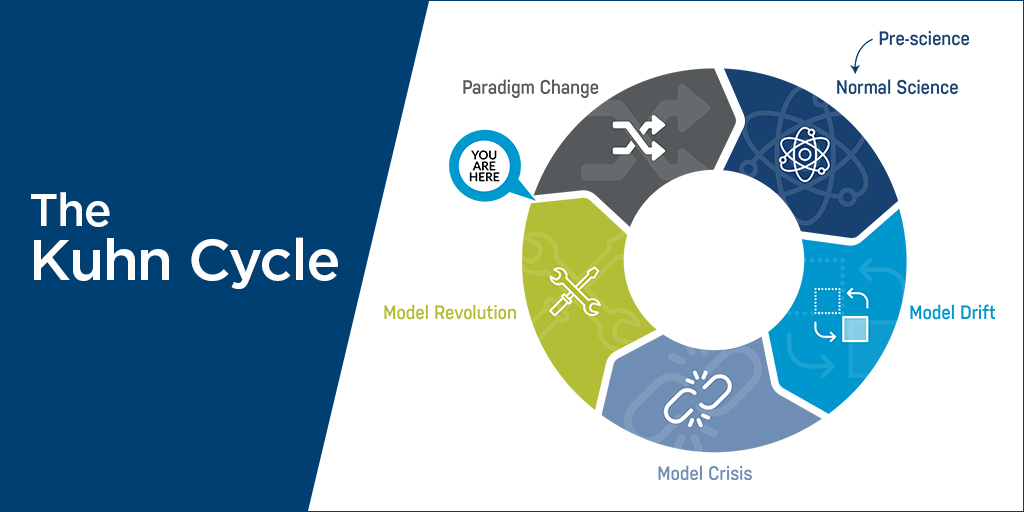There are moments in your life that are seared into your memory. This usually happens because they either fundamentally change how you think about or tie together fragmented ideas you hold about the world around you. The underlying rules and patterns of existence. For me one of those moments was the introduction of the paradigm shift concept. The first time I ever heard the phrase paradigm shift was, ironically, in a literature class. Here we were introduced to Kuhn’s Structure of Scientific Revolutions, the Kuhn Cycle, and the concept of paradigm shifts. Not only about radical shifts in scientific disciplines and how they occur but also the ripple effect they have on our social structures, behaviors, and norms.
 The Kuhn Cycle is defined by 5 stages:
The Kuhn Cycle is defined by 5 stages:
-
Normal science—the common model of understanding and problem solving for a discipline.
-
Model drift—the discipline starts to be faced with new questions or anomalies that the current model cannot address.
-
Model crisis—the current model can no longer be applied to all problems and unresolved anomalies appear in greater volume. Additionally, the discipline practitioners can no longer patch the model.
-
Model revolution— one or more candidates appear to resolve the crisis and the discipline struggles with a new model.
-
Paradigm change—is where the new model is established by early influential supporters.
Eventually the paradigm shifts as the new model becomes the commonly accepted methodology and the cycle settles back into the normal science stage.
So, what does this have to do with process management?
I would argue that the process management discipline is somewhere between the model revolution and paradigm change stages of Kuhn’s Cycle.
In a recent survey on process and performance management priorities we found that 88 percent of process practitioners feel that process management needs to re-evaluate its competencies to stay relevant in today’s business.
In other words, process management is faced with anomalies, new challenges, and problems that cannot be addressed by traditional methodologies. The specific challenges or drivers of the crisis include:
- Pace of change—it is argued that traditional methodologies are too slow or cumbersome to keep up with the need for agility. Namely the necessary cycle of rapid experimentation and problem-solving organizations need for flexibility.
- Digitalization—this includes the prominence of digitalization initiatives in organizations and the expansion of related projects around automation, advanced analytics, machine learning, and AI.
- Customer-centricity—due to the emphasis on the customer experience organizations require process and performance improvement opportunities to emphasize the needs of the customer.
However, process management is not in a state of model crisis because process teams and influencers already understand the candidates to alleviate the crisis, namely:
-
Customer-centric methodologies—incorporating design thinking, customer journey maps, and end-to-end process design into process management practices.
-
Flexible project management practices—adopting Agile or Scaled Agile Frameworks to improve cycle time and include customer/end-user perspectives in process management efforts.
-
Advanced technologies—understanding, developing skills related to, and integrating advanced technologies as part of the improvement solutions toolkit.
The good news is that no paradigm shift is without its opportunities. The drivers of change—agility, customer-centricity, and advanced technologies—also provide process management with the opportunity to become a strategic asset to the organization. For additional insights on this paradigm shift check out, Process Management Paradigm Shift.
APQC will be working throughout 2018 to prepare you for this paradigm shift.
Stay tuned for additional research around the impact on process and performance management teams and deep dives into the solutions (e.g., customer-centric tools and advanced technologies).
For more process and performance management research and insights, follow me on twitter at @hlykehogland or connect with me on LinkedIn.